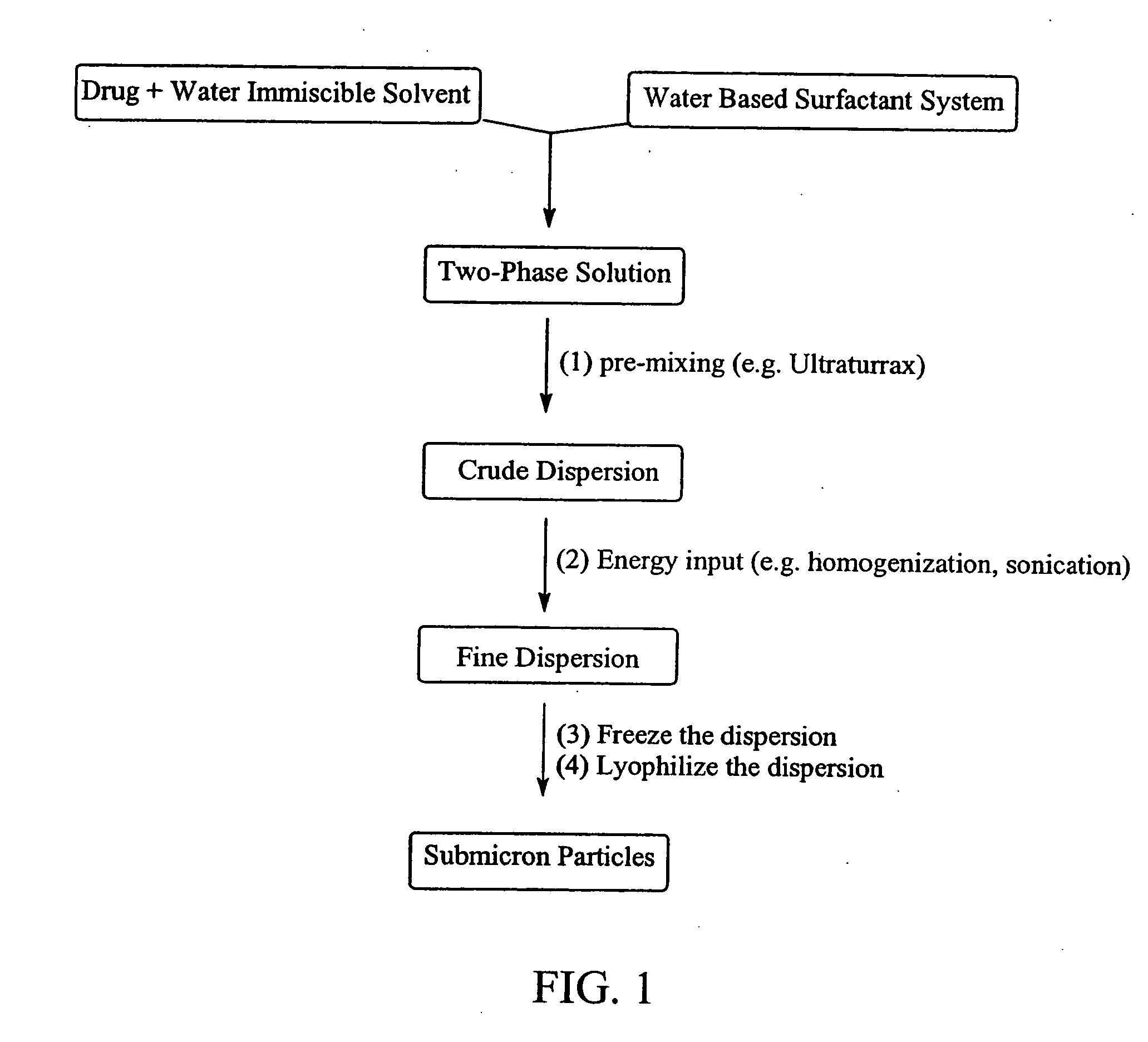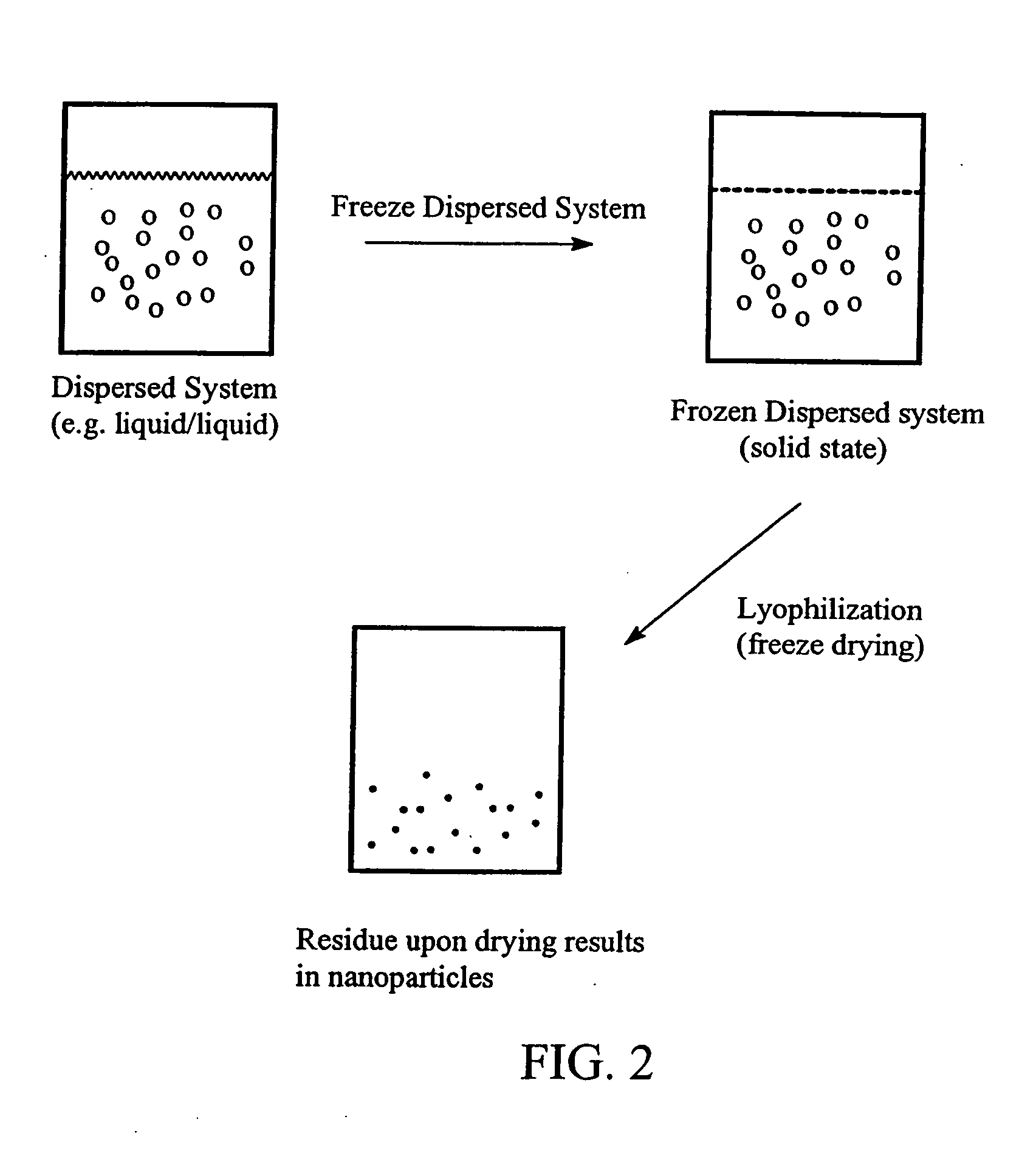Preparation of submicron sized nanoparticles via dispersion lyophilization
a technology of nanoparticles and dispersed lyophilization, which is applied in the preparation of microcapsules, capsule delivery, microcapsules, etc., can solve the problems of irritation at the site of delivery, unstable emulsions, and a large number of pharmaceutical drugs being formulated that are poorly soluble or insoluble in aqueous solutions
- Summary
- Abstract
- Description
- Claims
- Application Information
AI Technical Summary
Benefits of technology
Problems solved by technology
Method used
Image
Examples
example 1
Nanoparticles of Itraconazole using Sonication to Create the Fine Dispersion
[0046] Itraconazole (0.5 grams) was dissolved in 3 mL of methylene chloride and combined with 50 mL of a 5% albumin solution. The combined solutions were manually shaken to effect dispersion of the two liquids. The crude dispersion was than sonicated at 5° C. for 6 minutes (sonicating every other 30 seconds using a ¼″ probe at 20% amplitude). The sonicated solution was frozen at −80° C. and subsequently lyophilized. The lyophilized product was analyzed by light scattering detection (HORIBA), which revealed particles having a mean diameter of 187 nm.
example 2
Nanoparticles of Cyclosporin using Sonication to Create the Fine Dispersion
[0047] The general process described in example 1 was repeated except cyclosporin was used in place of itraconzole. Final particle size was 185 nm (HORIBA light scattering analysis).
EXAMPLE 3
Dispersion Lyophilization (using Homogenization as the Energy Addition Step)
[0048] Itraconazole (0.5 grams) was dissolved in 5.0 mL of dichloromethane and mixed with 50 mL of a 5% albumin solution. This was made into a crude dispersion by treatment with an Ultraturrax-T25 mixer for 10 seconds. The crude dispersion was homogenized at 10,000-12,000 psi using an Avestin Emulsiflex C5 homogenizer for 6 passes in the temperature range of 18° C. to 27° C. to form a fine dispersion. The fine dispersion was immediately frozen at −80° C. and lyophilized without temperature control to produce a fluffy powder. The powder was reconstituted with water and the solid particle dispersion analyzed by light scattering detection (HORIBA)...
example 4
Sterile Filtration Incorporated into the Dispersion / lyophilization Process
[0049] Itraconazole (0.5 grams) was dissolved in 5 mL of dichloromethane and combined with 50 mL of a 5% albumin solution. The contents were then made into a crude dispersion by treatment with an Ultraturrax-T25 mixer for 10 seconds. Homogenization of the crude dispersion at 10,000 to 15,000 psi (Avestin Emulsiflex C5 homogenizer) for 5 minutes in the temperature range of 23° C. to 30° C. resulted in a microdroplet or fine dispersion. This microdroplet dispersion was easily filtered through a 0.22 μm membrane filter. Inspection of the filter did not reveal the presence of any drug material. The filtered dispersion was then frozen at −80° C. After several hours the frozen dispersion system was lyophilized without temperature control to produce a fluffy powder. The resulting lyophilized cake, containing solid itraconazole particles, was reconstituted with water and the dispersion analyzed by light scattering de...
PUM
| Property | Measurement | Unit |
|---|---|---|
| mean particle size | aaaaa | aaaaa |
| mean particle size | aaaaa | aaaaa |
| frequency | aaaaa | aaaaa |
Abstract
Description
Claims
Application Information
 Login to View More
Login to View More - R&D
- Intellectual Property
- Life Sciences
- Materials
- Tech Scout
- Unparalleled Data Quality
- Higher Quality Content
- 60% Fewer Hallucinations
Browse by: Latest US Patents, China's latest patents, Technical Efficacy Thesaurus, Application Domain, Technology Topic, Popular Technical Reports.
© 2025 PatSnap. All rights reserved.Legal|Privacy policy|Modern Slavery Act Transparency Statement|Sitemap|About US| Contact US: help@patsnap.com


